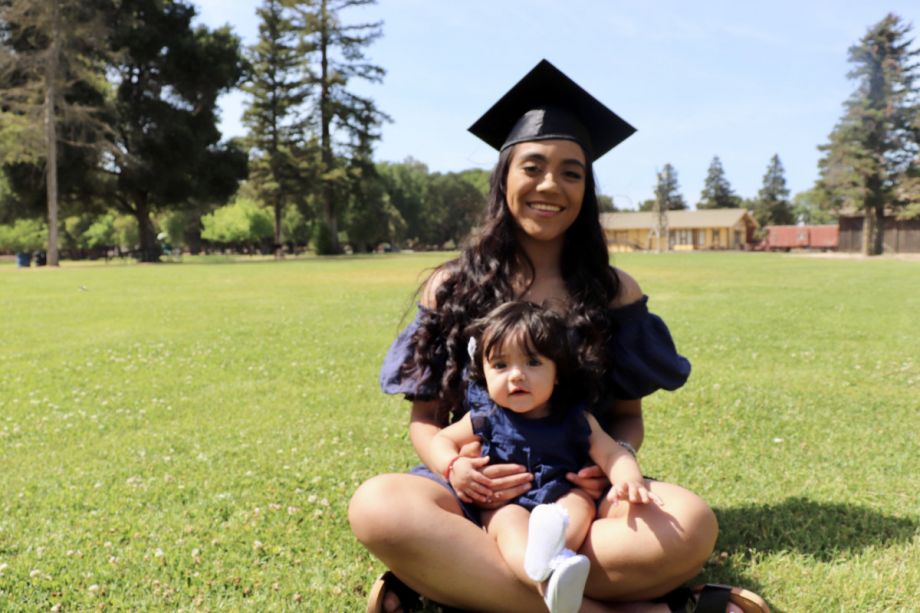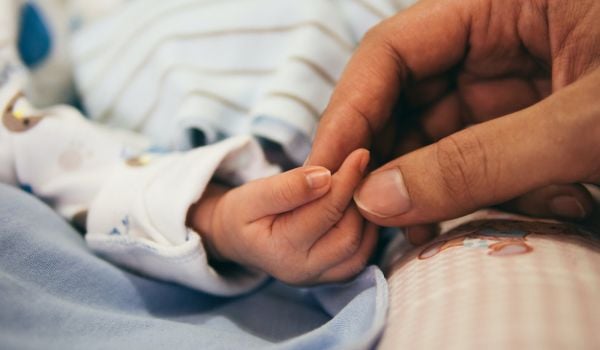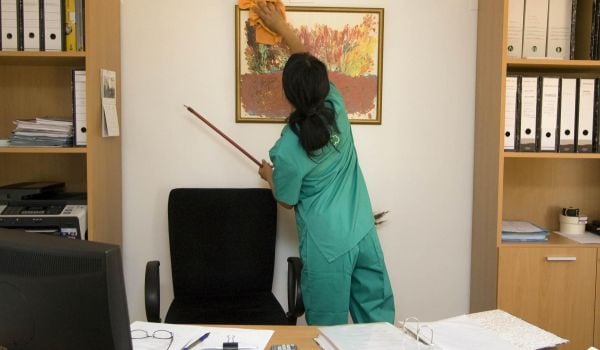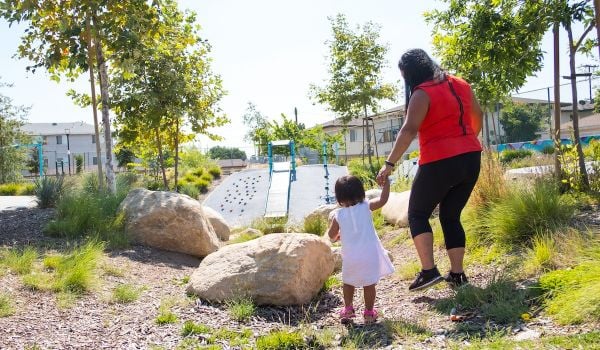When Emily, now 20, found out she was pregnant four years ago, she was flooded with fear. “I was scared to tell my parents,” says Emily, who spoke to Next City using only her first name to maintain her privacy. “I was just scared.”
She was only a junior at the time, attending Everett Alvarez High School in Salinas, California. Soon, she would come to find, being a pregnant teenager and eventually a young mom came with a great deal of social ostracization.
In the early days of her pregnancy, Emily’s friends stopped speaking with her. And when she did tell her parents, her mom was disappointed. Her dad, who she always had trouble speaking to, stopped talking to her entirely. To this day, they don’t communicate.
But soon after, she happened to meet another teen who was pregnant. “She was eight months, and I was three months,” she recalls. She told Emily that she had been attending parenting classes and workshops at a high school across town, Mount Toro High School. “She told me about how helpful they were and about the resources they had. They handed out diapers and gave parenting advice.”
Mount Toro is located in the same school district as Everette Alvarez, Salinas Union High School District, the largest school district in Monterey County. But the entirety of the Mount Toro campus is an alternative school, making it the perfect fit to house programs that meet very specific needs, like teen motherhood. So in 2018, Emily attended her first workshop by Harmony At Home’s Teen Success program.
Harmony At Home is a local Monterey County nonprofit dedicated to ending the cycles of poverty and violence. Its Teen Success program takes aim at the root causes of those cycles, guiding expecting mothers and current mothers ages 14-24 through the turmoil of adulthood, parenting, education and health.
The cycles of poverty and violence are generational and are hidden in plain sight according to Harmony At Home CEO Julianne Leavy. “We’re talking about breaking the cycle of poverty and the cycle of teen paternity. Most teen moms today have mothers who were also teen mothers,” says Leavy.
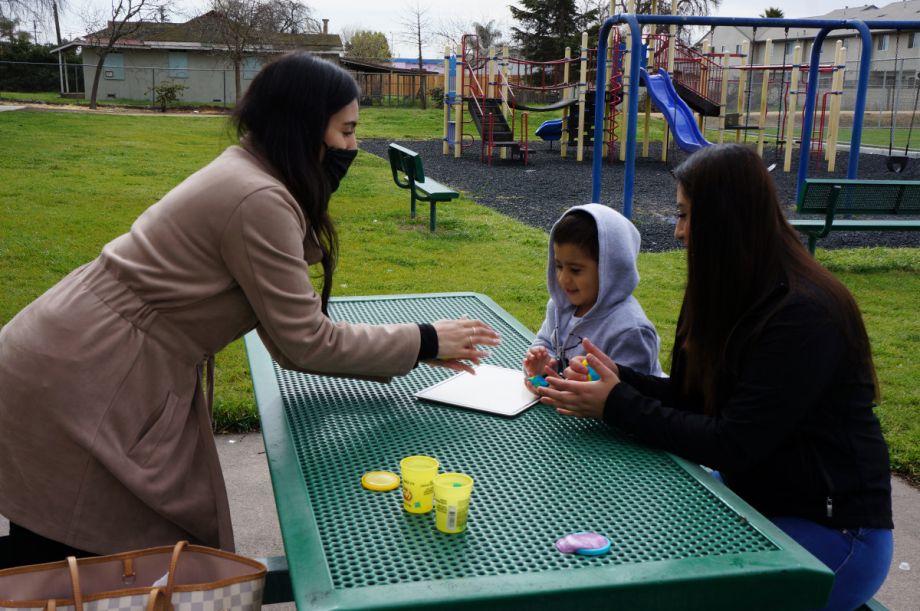
A Teen Success advocate (left) guides a member (right) and her son through an art activity. (Photo by Esmeralda Owen)
California’s teen fertility has been trending down for the last decade, paralleling a national 64% decrease in teen pregnancy.
Despite this, Monterey County still stands out. According to data collected by the Monterey County Department of Health and the California Department of Public Health, the fertility rate is 11.4 per 1,000 females ages 15-19. But within Monterey County, that figure is 22.3 per 1,000.
“While rates are decreasing in the state, Monterey County still has twice the rate of teenage pregnancies compared to the state,” says Teen Success program manager Sandra Mendoza.
According to the Center for Disease and Control and Prevention, teen pregnancy and subsequent parenthood often trigger detrimental social and economic consequences. Just about half of teen mothers will achieve a high school diploma or equivalent by the age of 22. Children of teen mothers are also more likely to have negative health and educational outcomes, and become system-involved, with higher rates of foster care intake and incarceration.
Social determinants also play a huge role in who becomes a teen parent, with poverty and foster care involvement increasing the likelihood of teen pregnancy. The CDC also reports that Black and Hispanic teens are more than twice as likely to become teen mothers than white teens.
The CDC’s findings reflect the background and circumstances of the communities the Harmony At Home program serves. According to Mendoza, of the 60 or so moms whom they serve, the majority are low-income and have not yet completed their high school education. Around 96% are Latino. Though the program has expanded throughout Monterey County, the majority of attendees participate in their Salinas programming.
Core components of the program include classes on overall healthy parenting and early childcare, comprehensive conversations on family planning and sexual health, financial planning and educational attainment. All participants have to be enrolled in school, or plan to enroll or re-enroll. The program is guided by facilitators called “advocates,” who coach and help their participants access local and government resources, such as SNAP and WIC.
Emily’s first advocate was a teen mom herself, and everyone who attended during her first session was either an expecting mother like her, or already a parent themselves. She joined the program officially, eventually transferring to Mount Toro High School to relieve the long bus commute to and from school.
With the support she received from the program, Emily graduated from high school a semester early. “I think without the program I wouldn’t have graduated early. Maybe I could have, but it would’ve been hard,” she says.
At its inception, Teen Success was meant to be an 18-month program with the ultimate goal of creating self-sustaining successful young families, headed by teen mothers with at least a high school diploma. The program now supports young families well beyond the 18 months, as needed.
But Mendoza points out that, while all schools want academic success for their students, the academic progress of teen mothers is influenced more heavily by socioeconomic and cultural factors most schools aren’t equipped for.
“Schools may have counselors, but we meet them on a different level beyond academics,” says Mendoza. “We help them with little things like diapers, but we also talk about personal finance and overall wellness.”
This year, in its 2021-2022 cycle, the program helped 32 participants countywide, who in total completed 768 hours of coaching. Three graduated from high school, and six completed enough credits to earn their high school diploma. Two members plan on continuing on to local community colleges.
After a few years, Harmony At Home found more funding and an opportunity to guide its participants through the early stages of young adulthood. “When we thought about it, learning to become an adult doesn’t just stop at 18 or 20,” says Joaquin Hernandez, director of operations for Harmony At Home. “They’re all expected to be adults, but learning how to be a parent and adult can continue a decade into their twenties.”
The organization extended the age range of eligible participants and began offering support through their post-secondary educational opportunities. Hernandez says some of the more popular pursuits are nursing schools and enrolling in community colleges. But the program encourages all sorts of education and licensing programs. “It doesn’t always have to be college. We have a couple who are enrolled in beauty schools and one participant who wants to be a tattoo artist,” says Hernandez.
The expansion of the program also allowed them to cultivate relationships with other local school districts, the Monterey County Office of Education and other community groups. (Salinas Union High School District remains their largest partner.)
The program expects to serve 91 mothers in the 2022-2023 fiscal year with a $487,000 budget, which is about $5,400 per participant. Though Leavy knows that sounds like a large number to invest in one person, the benefits outweigh the costs in the long run. “If you think about continuing the cycle of poverty, it’s much more expensive to society as a whole — like quadruple that amount per year for welfare and foster care systems,” says Leavy.
Though the numbers fluctuate depending on which programs are calculated, estimates from various reports and health officials agree that the short-term annual costs of unintended pregnancy is roughly $9.4 billion nationwide. That number does not account for the long-term public costs of supporting the child and family.
Teen Success doesn’t solve all problems that come with early motherhood. Stable housing remains a huge stressor in the lives of their mothers, and childcare—if not offered on-site through their partners—can be somewhere between tricky and impossible to coordinate. But it remains a popular program, especially as the nonprofit offers the program for free to their partners, skipping the messy bureaucracy and budget considerations that usually come with traditional programming partnerships.
As for Emily, she is currently enrolled at California State University Monterey Bay, majoring in agricultural plant and soil sciences. Her 3-year-old daughter is healthy and happy. She still attends workshops at Teen Success and is currently learning about building her credit in order to buy her and her daughter a house in the future.
“Growing up, my mother has always been a single mother, and we couldn’t afford to have our own place. We were always living with other families,” she says. “I want something different for her. That’s one of my goals, to buy us a house.”

Marielle Argueza is Next City’s Equitable Cities Reporting Fellow for Racial Justice Narratives in partnership with Triad City Beat in Greensboro, North Carolina. Formerly Next City's INN/Columbia Journalism School intern for Summer-Fall 2022, she’s a journalist with more than a decade of experience reporting on education, immigration, labor, criminal justice, climate and more. Her work in K-12 education is award-winning and she was recognized multiple times by the California News Publishers Association. She is a recent graduate of Columbia Journalism School, where she was Toni Stabile Investigative Fellow. Her work includes a story on Harlem’s last assisted-living facility for people living with HIV/AIDS; a profile on New York State’s first Farmers Union; and a database of deaths within the Milwaukee County Jail. She is also a recipient of other fellowships and scholarships from several notable organizations within the news industry including the Asian American Journalists Association, Association of Alternative Newsmedia, ProPublica, and the Journalism and Women Symposium.

